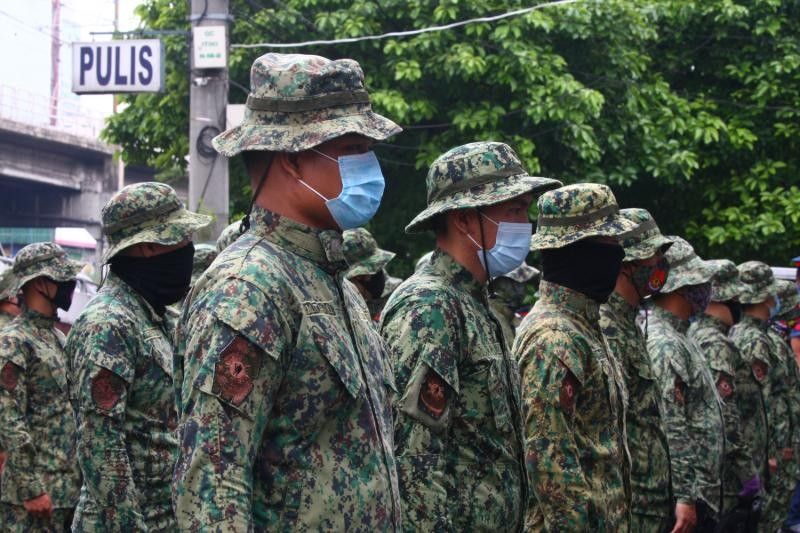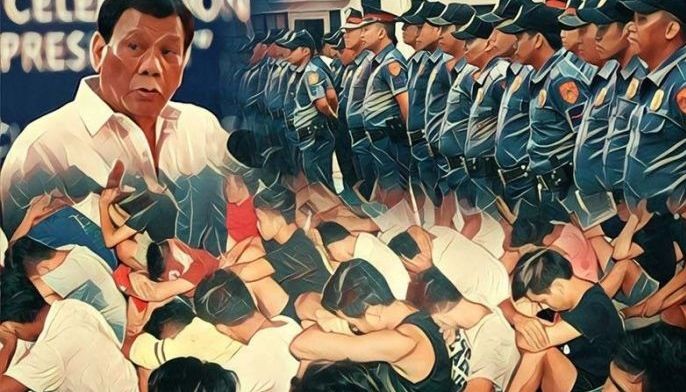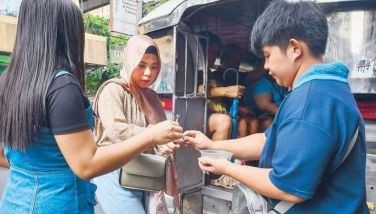Health workers to lead 'Oplan Kalinga', but house-to-house ops still unclear

MANILA, Philippines — Another wave of statements from government agencies added little clarity on whether or not a house-to-house campaign for coronavirus patients will take place in the coming days.
Walking back statements from Tuesday, the government said health workers and local government personnel — not the police — will be sent to find patients of the coronavirus and "transfer" them to containment facilities.
In a statement issued Wednesday afternoon, Interior Secretary Eduardo Año clarified that cops take part in the program, called "Oplan Kalinga," but only in a supporting capacity "limited to assisting in transporting patients and ensuring that lockdowns are imposed."
Just the day before, Año, a former military general, said in a press briefing that "with the help of our local governments and the Philippine National Police, we'll be going house by house and we'll be bringing positive [cases] to our COVID-19 facilities."
He also encouraged the public to report anyone hiding their being positive for the coronavirus, even warning that there was a law penalizing the withholding of such information.
READ: Public told to report neighbors with COVID-19 as cops prepare to go house-to-house
"Again, I wish to emphasize that the PNP’s presence in the conduct of the said program is purely for support and assistance to the LGUs who are taking the lead in the defeating COVID-19 in the communities," Año said in his Wednesday statement.
"And the police will just assist local health authorities so I don’t understand why they think this way. That is pure speculation," he added.
Though the differing statements are agreed that anyone found to be carrying the new pathogen will be "transferred from their homes to government facilities," it is unclear if this will be done house by house, and by whom.
House-to-house or not?
The Department of Interior and Local Government clarified in a statement that "the local government unit (LGU) through its Local Epidemiological Surveillance Unit will be the one to visit the households with COVID-19 patients," a sentiment that presidential spokesperson Harry Roque contradicted later the same day.
"Let me make it clear: There will be no house-to-house search for COVID positive patients. They will have to be reported by the persons themselves, other members of the household, or their barangay officials," Roque said in a press briefing.
"We don't have a provision for house-to-house. Only the political critics of the government, again, weaponizing this very important task of tracing," he also said in an earlier interview that day with TeleRadyo.
READ: Confusion stirs amid conflicting statements on 'house-to-house' search for COVID-19 patients
But in yet another statement, Police Lt. Gen. Guillermo Eleazar, commander of the government's quarantine enforcement arm, also suggested that a house-to-house campaign would take place, saying: “It is not the policemen who will do the explaining and the police will not even knock on the doors of the houses of COVID-19 patients."
"Our personnel will just be on standby unless they are invited inside the house or their presence is needed inside," he added.
The DILG's clarification reiterated the need for the public to report COVID-19 patients undergoing home quarantine and without access to rooms and toilets for their exclusive use.
"We need to tell the authorities about these cases so they can be brought to proper facilities where they can recover. This is for the benefit of the community, so COVID-19 will not spread," the DILG quotes Año as saying.
'LGUs to take the lead'
Health Secretary Francisco Duque—who earlier claimed that the Philippines had flattened its coronavirus curve since April despite seeing a renewed surge in cases—also explained in an interview with CNN Philippines that: "If a patient is in his home without a separate room and bathroom, it is best to move to treatment and monitoring facilities."
The task force also clarified its criteria to consider an allowable and conducive place for self-quarantine inside a house:
- a room that could be used for self-quarantine;
- the room must be comfortable inside;
- no member of the household may be vulnerable to infection such as senior citizens or those with pre-existing conditions
Eleazar also echoed Año's sentiment, saying: "It is the health officers of the LGUs who will lead the fetching of the COVID-19 from their homes. The local police forces’ presence is only in the form of assistance for any eventuality and especially in escorting the patients to the isolation facilities."
“We assure the public that we are implementing this for the sake of public health, for the protection of everybody. Police intervention will always be the last resort because we believe that on the issue of isolation and treatment of COVID-19 patients, everybody is willing to cooperate,” he added.
Eleazar earlier claimed that the deployment of Special Action Force commandos in Metro Cebu was a necessity because of the "failures" and lapses in "discipline" on the part of the city's residents.
RELATED: Task force: SAF a solution to Cebu City residents' 'failure' to follow health protocols
“This is not anti-poor as some people would say. This is in fact pro-poor because we would be prioritizing COVID-19 patients who have no means to isolate themselves inside their houses because of the reality that they do not have a room to spare for self-quarantine,” he said.
"This is pro-poor because less fortunate COVID patients will be given the opportunity to stay in an ideal isolation facilities where all their basic needs will be provided by the government."
- Latest
- Trending



































